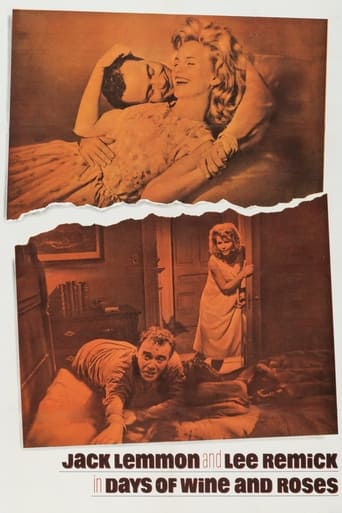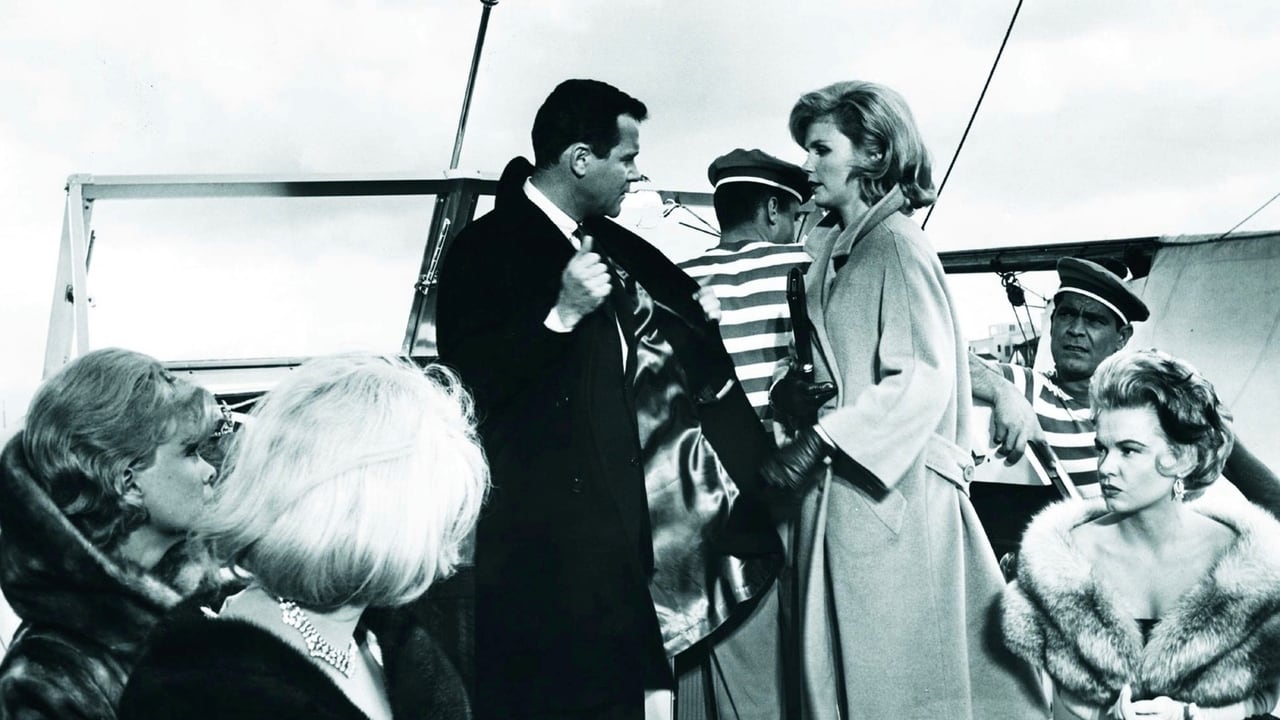Amy Adler
Joe Clay (Jack Lemmon) is a stellar public relations man in San Francisco. Much of his time is spent wining and dining clients and Jack is a party guy first class, drinking to excess. He even is ordered to find lady "escorts" for CEOs partying on a yacht. It is there that he accidentally mistakes Kirsten (Lee Remick) for one of the "invited" women. Woe to him, she's the boss' secretary. Nevertheless, he discovers two things. One, Kirsten is part of the window dressing, being very beautiful, and she does very little of the actual work. Secondly, even she can succumb to an attractive man's charms and humor, as she starts dating Joe, and hurriedly gets married to him. But, alas, Joe doesn't want to drink alone, so he introduces cocktails to his teetotaler new wife. Starting with Brandy Alexanders, which has the chocolate Kirsten loves, she suddenly, too, gets in the alcohol "game". Even the birth of their daughter, Debbie, doesn't keep the couple sober. On one of their drunken binges, Joe smashes up his father-in-laws nursery. Joe also loses his job and a few others when his drinking leads to big problems. At last, Joe has had enough and realizes he has to join AA. Kirsten refuses to go. She even goes away to distant hotels for weeks and Joe doesn't know where she is. Eventually, Joe has to make a decision, a heartbreaking one. How can he stay sober if he lets Kirsten be part of his new life? This sad, sad film has the horrors of alcoholism on full display. Especially sad is Remick's role, for she is goaded to drink and then can't stop. Yes, there are moments of humor, romance, beautiful scenery, costumes and Blake Edwards great direction. But, unless you love the stars or are in the mood for a cathartic sobfest, this movie will put you in a sobering state of mind.
frankwiener
This movie owes its powerful impact to the skillful direction of Blake Edwards (the "Pink Panther" series, "Breakfast at Tiffany's"), a very fine screenplay by J.P. Miller ("The Lindbergh Kidnapping Case", "Helter Skelter", "The Young Savages"), and the exceptional performances of three native Bostonians, Jack Lemon, Lee Remick, and Charles Bickford. Add a Philadelphian named Jack Klugman to complete the nearly flawless portrait of the heartbreaking pain of alcoholism or, for that matter, any battle against the life destroying abuse of substance.Immediately following his huge success only a year earlier with "Breakfast at Tiffany's", Mr. Edwards returns with what I personally feel is his greatest achievement as a director. The atmosphere created with every scene still captivates me even after several viewings.As to the acting, I have seen Jack Lemon in many movies, but, for me, this was his most unforgettable role. I enjoyed Lee Remick in just about every one of her movies that I have seen, going all the way back to her introduction as the young cheerleader in "Face in the Crowd", a movie that I didn't like very much. This performance was close to the top, if not at the very peak, for her as well, and I even include her exceptional work in "Anatomy of a Murder", which would not have been as good a movie without her magnetic presence. Charles Bickford was perfect as her silent, stoic father, who deeply suffered beneath the surface. Accolades must also go to Ken Lynch, a grossly under-rated but very familiar actor who appeared in as many as 200 movies and television productions, for the cruel, even satanic "pouring scene" that will remain in my mind forever.I won't mention the ending other than that it was very bold and innovative especially for 1962 standards, thanks mostly to Jack Lemon's determination not to change it under any circumstances. The haunting and very moving musical score of Henry Mancini also contributed significantly to an excellent, nearly perfect film.
gudpaljoey-677-715384
For the 1960s, this was a courageous ending to a tragic picture. How many viewers were wishing for Ms Remick to return from the street into the arms of Mr. Lemmon with a vow never to drink again. But rather we see an ending where the husband character knows that the only way to save his own life,and in a sense hers, is to watch her walk across the street from his window. Love is not diminished with the ending, it is enhanced. The picture deals with the alcoholic differently that most movies before it. More realistically, the drinker in older movies is shown as a loner outside society drinking for only one reason to get soused. Here we have two codependents in a marriage,drinking because they find it exhilarating, great sport and an escape from the dismal world they both find themselves in. I did think that the giddy swinging of bottles in the air was way overdone and more should have been made of their compatability as drunks by showing more affection for each other during these scenes. However, he scene of Mr Lemmon tearing up the green house was startling, although his alcholic rages were also taken a little too far.
Steffi_P
(Spoilers in final paragraph only)Alcoholism is not an easy subject to tackle, especially in a medium where drunken bums tend to be figures of fun. Over the years you can see an evolution in how Hollywood has treated the problem of drink as sensibilities have changed. DW Griffith's The Struggle in 1931 was a nice try but appallingly poor taste, with am unconvincing, comedy drunk act. The Long Weekend (1945) went for harrowing realism and was for the most part effective, but it fell at the last hurdle and ended up being the very thing it tried not to be – a surreal melodrama that was unintentionally comical. Days of Wine and Roses however avoids this trap by being mostly realistic, whilst adding a light a sprinkling of comedy to offset the serious moments and make the tragedy run deeper.Days of Wine and Roses is rarely laugh-out-loud funny, but the first half-hour or so has a light air of irreverence. The JP Miller screenplay gives us dialogue that really sparkles with both wit and familiarity. Take for example the "Corporation x" conversation between Jack Lemmon and Charles Bickford. It's vaguely humorous but also a credible of the kind of talks people have, and gives us a concise and engaging introduction to Bickford's character. It's also important exchanges like this actually have nothing to do with alcoholism, they are just building layers of reality and interest to give the main story its human backdrop.Miller's words are brought to life by a note-perfect cast. Jack Lemmon's performance has a slight comic edge to it, without quite being the comic-relief drunk act. He has a hint of silliness about him even when he is sober and the implication is that he has a rather crazy personality which gets exaggerated when he drinks. It works very well. Co-star Lee Remick matches and if anything surpasses him. Her portrayal of drunkenness is more realistic; appropriate because her story is really the more tragic. Charles Bickford and Jack Klugman give some perspective with two powerful – but very different – performances which are completely sober and serious. In Bickford's case it's one of the last of an incredible career, in Klugman's one of the few opportunities he really got to shine.Director Blake Edwards was a minimalist when it came to style and technique, keeping things simple to focus us on the performances. That's not to say he can't do some clever visual arrangements. One of his trademarks is the party scene, and the example here is realistic, vibrant, but never enough to upstage the characters in the foreground. In most scenes Edwards keeps his camera fixed and pans to follow the actors as they caper about, making the backgrounds a blur but the characters continually in our attention. He often lets the players take their time over a scene, allowing for moments of contemplation or protracted outbursts. The greenhouse scene is a real masterstroke. We know exactly how this one is going to pan out, and we feel powerless as it unfolds before us with painful slowness.Of course, the origin of such powerful moments is JP Miller's screenplay, his structuring and clever little vignettes. Which leads me onto one final point that makes Days of Wine and Roses stand out above its predecessors. This picture takes the step The Lost Weekend didn't dare to. It refuses to give us a happy ending, and instead leaves the story hovering in ambiguity. Why is this so important? Quite simply we could not accept it. We know Joe has already recovered and relapsed several, and his happily-ever-after is not guaranteed. To finish the story happily would seem false, and make everything that went before it just a little pointless. As it is, we are left with a chilling, lingering feeling of doubt.



 AD
AD





